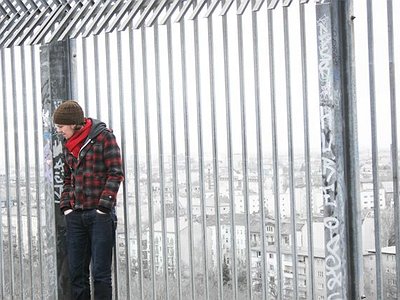Not content
The relationship between music and other forms of art – painting, video art and cinema most importantly - has become increasingly important. How do you see this relationship yourself and in how far, do you feel, does music relate to other senses than hearing alone?
A lot of people tell me they see a lot of different things when they listen to my music, and often have vivid pictures to describe to me that they saw while listening. Unfortunately, I have never really experienced this at all - I don't see anything when I listen to music. The sound itself is enough for me; it can certainly trigger memories but I suppose I have the opposite of Synaesthesia. Having said that, I enjoy working with dance, or when my music is used in a film, as it's nice to join the dots between different mediums and to play a part in realising someone else's vision.
There seem to be two fundamental tendencies in music today: On the one hand, a move towards complete virtualisation, where tracks and albums are merely released as digital files. And, on the other, an even closer union between music, artwork, packaging and physical presentation. Where do you stand between these poles?
For me, with every album, I want to create a memorable experience for people that they will want to go back to again and again, and the packaging and presentation can definitely add to that when done well - although, of course, the music is what really counts. The artwork of an iconic album will also become iconic, but great design will mean nothing if the music isn't comparable.
I actually disagree with the question itself slightly, as I would say that listening to music through the Internet also comes with a HUGE amount of packaging and presentation. The packaging is the website, the advertising, the software you are using, the device you are using. At times, all of this packaging seems like the main event and the music itself is just secondary, just "content". At least with a physical release, the artist has more control over how the music is presented. Even if it's just a white-label release, that format alone has a certain history and puts you in a certain mood before listening. But how is a 30 second car advert getting people in the mood to listen to my music when they are streaming it on YouTube? It completely devalues it.
The role of an artist is always subject to change. What's your view on the (e.g. political/social/creative) tasks of artists today and how do you try to meet these goals in your work?
I would like to find a way to be more politically active with my music. I think the act of trying to create something beautiful and beneficial is a tiny political statement in itself, but it's certainly not enough compared to the scale of the problems the world is facing. I think a lot of artists and musicians gave up on politics because it's damaging to the fan-base: you are always going to alienate someone if you start to talk about politics. But there are a lot of problems out there that we should be discussing and I think the arts is as good a forum as any to start that dialogue.
Music-sharing sites and -blogs as well as a flood of releases in general are presenting both listeners and artists with challenging questions. What's your view on the value of music today? In what way does the abundance of music change our perception of it?
Music appears to be worth less and less with every day. The Internet didn't really deliver on any of its promises: people are only more connected in a superficial way, artistic horizons have not expanded, creative development has slowed to a standstill. We live in a disposable world, and the devaluation of culture is only a very small part of that.
How, would you say, could non-mainstream forms of music reach wider audiences?
I don't think that should be the concern of the artist - he or she just has to do what feels right, and then if that resonates will a large of group of people, then that's great. Perhaps that kind of integrity is what could actually help raise the platform of the artist. Take Daft Punk for instance. Two geeky French guys are now one of the most famous bands in the world and I think a big part of why they are so successful is because they always just did what they wanted to do and not what they "should" do. Maybe an eagerness to join the mainstream is in fact stifling non-mainstream music.
Usually, it is considered that it is the job of the artist to win over an audience. But listening is also an active, rather than just a passive process. How do you see the role of the listener in the musical communication process?
I think for my music to work in some way, there has to be some kind of collaboration between the music and the listener. It plays such a huge role. For me, this is especially evident in a live setting, where if I can feel an audience is actively involved in the music, I in turn become more involved and the evening just becomes better and better for everybody.
Reaching audiences usually involves reaching out to the press and possibly working with a PR company. What's your perspective on the promo system? In which way do music journalism and PR companies change the way music is perceived by the public?
I think PR is a necessary evil. Some ways of doing it are better than others. I try to stay away from it as much as possible, but luckily I have the guys from Denovali taking care of it for me in a clear and ethical way. I see music journalism differently: at best it's done with love and attention, and can be an extension of playing your favourite new records to a friend or two.
Please recommend two artists to our readers which you feel deserve their attention.
Mark Ernestus: His productions with Moritz Von Oswald in Rhythm & Sound and Basic Channel are some of my favourite records, but I mention Mark in particular as his recent production and remix works have been amazing. He has been producing a band called Jeri-Jeri from Senegal, and I have been avidly collecting all their records recently. The players are completely amazing, but the production is what makes it sound so fresh. He also just released a new 12" in collaboration with Ben Zabo from Mali, and I have been really enjoying that too.
[Read our Moritz von Oswald interview]
Martyn Heyne: He is a touring member of Efterklang, and also plays in The Group with a bunch of other great musicians and myself. He just finished his debut album, and it's amazing, yet it still doesn't have a label. Watch out!
Find out more about Greg Haines at his website greghaines.wordpress.com






